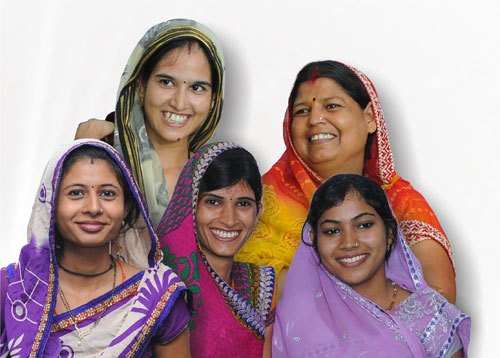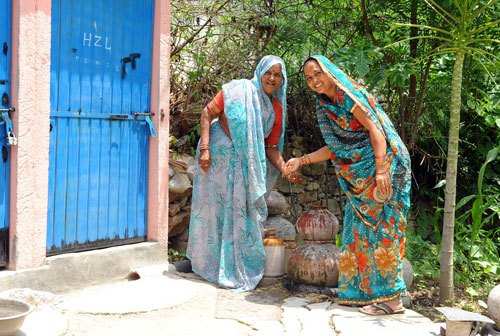All for the rural women of Rajasthan
Hindustan Zinc's Maryadaa Campaign has been providing house-hold toilets in villages and Sakhi Campaign is building rural women entrepreneurs...
 Hindustan Zinc’s Maryadaa Campaign has been providing house-hold toilets in villages and Sakhi Campaign is building rural women entrepreneurs…
Hindustan Zinc’s Maryadaa Campaign has been providing house-hold toilets in villages and Sakhi Campaign is building rural women entrepreneurs…
India is a country where most of the population resides in villages. Thus, it becomes imperative to develop these villages and bring infrastructural changes while increasing the flow of information to turn them into model villages. Awareness is the key to success.
It is said, ‘if you want India to grow, empower rural woman, as when you empower a rural woman, you in-turn empower the entire family, a village and ultimately a country’. Assessing the needs of rural women in Rajasthan and to give impetus to on-going programmes on women empowerment and rural sanitation, Hindustan Zinc launched two exclusive campaigns this financial year, the campaign, ‘Sakhi’ which is empowering more than 6,000 rural and tribal women and turning them into rural women entrepreneurs and the campaign, Maryadaa where Hindustan Zinc is constructing 30,000 toilets in the rural Rajasthan and spreading awareness about good sanitation and health and hygiene habits.
Campaign “Sakhi” for women empowerment and entrepreneurship:
Hindustan Zinc has been engaged in empowerment of rural women through formation of self-help-groups since 2005-06. Each group has about 12-15 rural and tribal women and these women are being developed as rural women entrepreneurs who are managing their own micro -enterprises. The self-help-group training starts with teaching them thrift savings, linking them with banks and then segregating them as per their interests for extensive vocational training in farm and non-farm based sector. Today, Hindustan Zinc has more than 450 Sakhi-self-help-groups across five districts of Rajasthan: Udaipur, Chittorgarh, Rajsamand, Bhilwara and Ajmer.
Interaction with these women has always been a challenge as these women are primarily from remote villages and are not quite open for dialogue or conversation. Family pressure and their household work further adds up to this pressure. This makes the task of community connect team of Hindustan Zinc more difficult. Convincing these women and then their families takes days of regular interaction and motivation. Finally, when these women see their siblings come out of their homes and improve their social and economic condition, they agree.
These rural women of self-help groups popularly known as ‘Sakhi’, once trained in vocational traits, start getting orders from the different markets, towns as well as big cities. A coordinator has been kept by the company for managing a cluster of Sakhi self-help-groups who helps in getting orders for these Sakhi self-help-groups and coordinates the production.
Not every woman wants to get trained in garments, accessories, home-furnishing or other products; some are inclined to continue with their ancestral trait like agriculture and livestock development. For these women, special projects and training sessions are developed and organised like cash crop cultivation, water harvesting, green-house development, seeds selection, etc. For women connected with livestock, training is given on breeding and artificial insemination, managing livestock, immunisation etc.
The Sakhi campaign’s objective is to make these women as much self-sustainable and empower them socially and economically so that support their families and improve their overall lives.

Campaign “Maryadaa” for toilets construction and sanitation awareness:
India is counted amongst the nations who are suffering from a large population involved in open defecation. According to the reports by UNICEF, only 48 per cent of Indian rural population has good toilets and sanitation facilities. More than 50 per cent of Indian population defecates in open. Only 21 per cent of India’s rural population uses improved sanitation facilities out of 31 per cent of national figures.
In countries like Bangladesh and Brazil, only 7 per cent of their population defecates in open. In China, only 4 per cent of the population defecates in open.
In India, Rajasthan in particular is a state where about 60 per cent population defecates in open. A report by World Health Organisation also mentions that over half a billion (more than 50 crore) people in India still continue to defecate in gutters, behind bushes or in open water bodies with no dignity or privacy. Lack of awareness and infrastructure is a leading reason for people to defecate in open. No doubt, the figures are quite high in rural India but even the large cities and metros are not behind.
To create awareness and construct tenets in rural Rajasthan, Hindustan Zinc launched its campaign Maryadaa. On the initiative by Rajasthan government, Hindustan Zinc signed an MoU to construct 30,000 toilets which would have two leach pits below to facilitate disposal of waste. As per the project, one leach pit would be opened at a time which is estimated to be full in about five years.
Once the first leach pit is full, the second leach pit would be opened.
By the time the second leach pit is full, the waste in the first leach pit would have been converted into manure, to be used in better yield of crops, And once empty, it would be good to use for the waste. These toilets would also minimise the risk of contamination of drinking water sources thus reducing the health related problems in rural India.
Under the Nirmal Bharat Abhiyan, under which these toilets are being constructed, the cost of each toilet comes to about Rs 8,500. About Rs 4,600 is being contributed by the state government, Rs 3,000 by Hindustan Zinc and Rs 900 by the beneficiary, Hindustan Zinc has already constructed 10,000 toilets in Bhilwara, Udaipur and Chittorgarh by now.
Lack of toilet facilities in the house is a grave concern particularly for the rural females and the problem becomes even worse during late hours or during pregnancy Toilet in each house provides not just comfort but is also a matter of dignity and brings sense of security.
Hindustan Zinc’s Maryadaa campaign is also spreading awareness about good sanitation habits and health and hygiene in the rural masses. The objective of Maryadaa is to eliminate open defecation practices in the villages and make Rajasthan an open defecation free state’.
Hindustan Zinc’s approach is to socially and economically empower rural women and construction of house hold toilets in rural houses is a step to directly impact the lives of rural women.
After all, it is all for the rural women of Rajasthan.
To join us on Facebook Click Here and Subscribe to UdaipurTimes Broadcast channels on GoogleNews | Telegram | Signal


